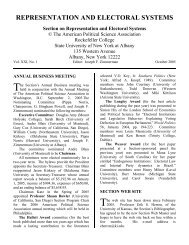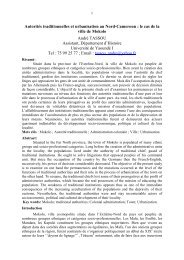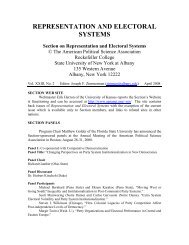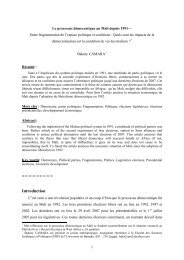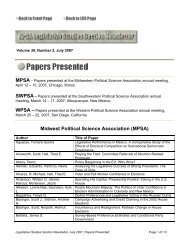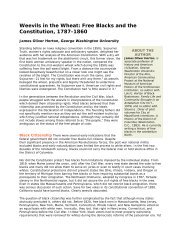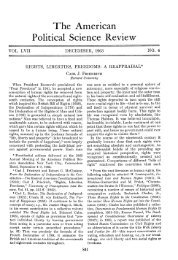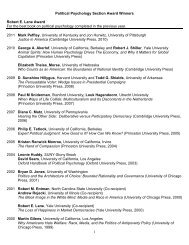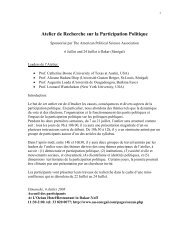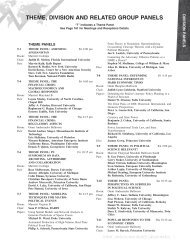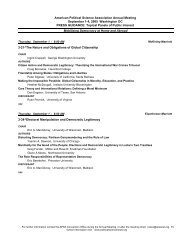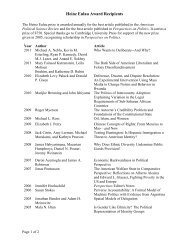representation and electoral systems - American Political Science ...
representation and electoral systems - American Political Science ...
representation and electoral systems - American Political Science ...
Create successful ePaper yourself
Turn your PDF publications into a flip-book with our unique Google optimized e-Paper software.
8<br />
minorities. Other courts have divided sharply over whether the Voting Rights Act applies<br />
to state laws that disenfranchise felons <strong>and</strong> ex-felons. The U.S. Circuit Court of Appeals<br />
for the 2 nd <strong>and</strong> 11 th circuits ruled that it does not apply. But the 9 th circuit has ruled that it<br />
does apply. The Voting Rights Act outlaws state election laws <strong>and</strong> practices that create<br />
greater barriers to voting by racial minorities than by non-minorities. The criminal<br />
justice system in the United States has tended to imprison disproportionately more racial<br />
minorities in most states <strong>and</strong> at most times in the nation’s history.<br />
Free Speech for C<strong>and</strong>idates <strong>and</strong> Activists<br />
On August 6, 2008, the U.s. Court of Appeals for the 9 th circuit ruled the First<br />
Amendment protects “vote-swapping” web sites. Such a web site is enables people in<br />
different states who do not know each other to meet (electronically) <strong>and</strong> to work out a<br />
private agreement among themselves to vote strategically in presidential elections. Two<br />
such sites were set up in California in 2000. They were for the purpose of letting Gore<br />
supporters in states known to be uncompetitive (in that year’s presidential election) to<br />
vote for Nader. In exchange, Nader supporters in states known to be highly competitive<br />
would vote for Gore. The California Secretary of State in 2000, Bill Jones, ordered the<br />
web sites to be shut down, threatening them that if they did not shut down, he would<br />
prosecute them for bribery. The 9 th circuit ruled in Porter v Bowen (06-55517) that the<br />
web sites were not engaged in bribery <strong>and</strong> that their activity cannot be banned.<br />
On October 4, 2008, the Washington State Supreme Court ruled a law making it a<br />
crime for a c<strong>and</strong>idate to make an untrue statement about his or her opponent violates the<br />
First Amendment to the U.S. Constitution. Although the mainstream press reported on<br />
this decision as upholding a “right to lie”, the c<strong>and</strong>idate who won the lawsuit always<br />
insisted that she had made a factual error when she charged her opponent with voting to<br />
close a facility for the developmentally disabled. The evidence does not show that she<br />
had “lied”. The case is Rickert v State (no. 77769-1). The vote was 5-4. The c<strong>and</strong>idate<br />
who won the case, Marilou Rickert, had been a Green Party c<strong>and</strong>idate for the legislature<br />
in 2002.<br />
CALIFORNIA PRESIDENTIAL ELECTOR INITIATIVE<br />
An initiative campaign was launched in 2007 to change the system of awarding<br />
California’s 55 votes in the Electoral College. Currently, all <strong>electoral</strong> votes for President<br />
<strong>and</strong> Vice President are awarded to the presidential-vice-presidential slate of c<strong>and</strong>idates<br />
receiving the largest number of popular votes in the state. The proposed initiative<br />
proposition would award two <strong>electoral</strong> votes to the slate receiving the largest number of<br />
state-wide popular votes. The remaining Electoral College votes would be awarded to<br />
the slate winning the popular vote in each of the 53 congressional districts. Twenty of the<br />
districts are viewed as safe Republican districts.



